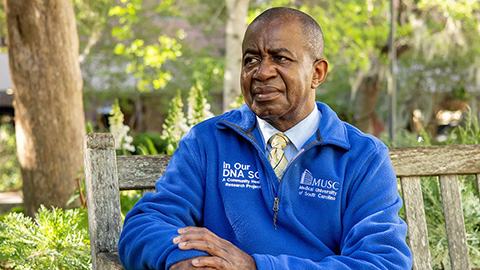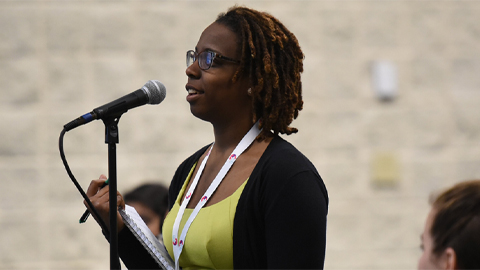National Academies propose initiative to sequence all RNA molecules
The National Academies of Sciences, Engineering and Medicine released a report last month that proposes a plan to develop the technologies and infrastructure needed to sequence all RNA molecules, including their modifications, from any biological system. The roadmap for a 15-year initiative focuses on advancing technology, centralizing data resources, expanding research, developing standards and cultivating a skilled workforce in the field.
Brenda Bass, professor of biochemistry at the University of Utah, co-chaired the Toward Sequencing and Mapping of RNA Modifications Committee.

“All major sectors — including health and medicine, agriculture, energy, commerce, defense, and national security — stand to benefit from a better understanding of RNA modifications,” Bass said in a press release. “There is a huge section of the bioeconomy just waiting to be unlocked, but it needs a coordinated effort and investment from public and private sectors to be realized.”
The Human Genome Project sequenced thousands of genes. This initiative would examine the hundreds of millions of modified coding and noncoding RNA transcripts that make up the epitranscriptome, all biochemical modifications of the RNA transcriptome. A typical mammalian cell contains over one million RNA molecules, which can be decorated with more than 170 modifications, such as N6-methylation and pseudouridylation.

The authors of the report include Susan Baserga, a professor of molecular biophysics and biochemistry at Yale University and chair of the American Society of Biochemistry and Molecular Biology Women in Biochemistry and Molecular Biology Committee.
Baserga said: “We are motivated by what we see as the next frontier in understanding gene expression, a basic science application. We are also motivated by an application in devising new RNA-based therapeutics and the potential of manipulating RNA modifications for food security. From a basic science point of view, we are interested in learning how RNA modifications change and influence RNA function.”
The committee called for increased funding from federal agencies, including the National Institutes of Health, National Science Foundation, Department of Defense and Department of Energy, to finance the initiative. However, the NIH budget saw only a marginal $300 million increase this year, which ASBMB Director of Public Affairs Sarina Neote described as “damaging to the vitality and longevity of the U.S. research enterprise.”

The past few years have shown how RNA can transform health and medicine. The 2023 Nobel Prize in physiology or medicine went to scientists whose early work on RNA modifications laid the foundation for the life-saving COVID-19 vaccines. In addition, according to the National Academies, preliminary data demonstrated that engineering RNA modifications in potato plants improved crop yields and drought resistance.

Despite these advances, much is still unknown about how RNA modifications influence the fate and function of RNA molecules.
“The biggest roadblock is that the technology for sequencing an RNA end-to-end, with all of its modifications, has not been invented yet,” Baserga noted.
The report said that limitation “significantly hampers the ability to study and leverage RNA modifications to address current and emerging societal issues.”
Therefore, the committee proposed prioritizing research on new tools and technologies to catalogue the epitranscriptome.
Equitable data management, storage and sharing has been a challenge for many researchers and a priority at the NIH. The federal agency recently released a Strategic Plan for Data Science 2023–2028, which outlined a plan to develop sustainable, secure and accessible biomedical data repositories and knowledge bases.
In line with this goal, the authors of the RNA report suggested that the NIH work with the National Center for Biotechnology Information to establish and maintain a sustainably funded and centrally managed database that houses up-to-date information on RNAs and their modifications. In addition, the authors asserted that databases, data exchange and nomenclature describing RNA should be standardized.
Finally, the authors brought up the need to expand the biomedical workforce by creating educational and training materials to promote scientific interest in RNA modifications.
Creating RNA modification profiles for diseases could lead to personalized and targeted treatments and initiate transformative changes across various sectors, beyond health and medicine, the authors wrote.
“The most important broader impact is educating the next generation of RNA biologists and technologists,” Baserga said. “We need a strong workforce to carry out the consensus committee’s vision and are hoping that the ASBMB can play a part in that education.”
Enjoy reading ASBMB Today?
Become a member to receive the print edition monthly and the digital edition weekly.
Learn moreGet the latest from ASBMB Today
Enter your email address, and we’ll send you a weekly email with recent articles, interviews and more.
Latest in Policy
Policy highlights or most popular articles

Genetics studies have a diversity problem that researchers struggle to fix
Researchers in South Carolina are trying to build a DNA database to better understand how genetics affects health risks. But they’re struggling to recruit enough Black participants.

ATP delegates push for improved policies
This ASBMB program helps advocates gain skills to address issues that affect science and scientists.

Advocacy workshops at Discover BMB 2024
Topics include running for office, becoming an advocate, and navigating the grant review process at the NIH.

NIH’s advisory committee releases report on re-envisioning postdoc training
The working group developed six primary recommendations for the National Institutes of Health.

When authoritative sources hold onto bad data
A legal scholar explains the need for government databases to retract information.

Can science publishing be both open and equitable?
An updated memo from the White House Office of Science and Technology Policy has researchers, funders and publishers looking ahead

